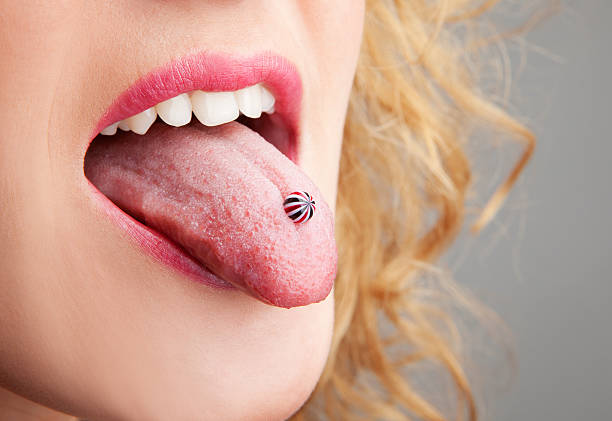Since there are many germs in
the mouth, an inflamed tongue piercing can quickly become a problem. We'll show
you what you can do if you have inflammation.
If a tongue piercing becomes infected, it is not only painful, but also dangerous. Mucous membranes quickly absorb bacteria and germs, and the inflammation can spread further. It is therefore important to identify the cause and support a quick healing.
Possible causes of an inflamed tongue piercing
To find out the cause of the
inflammation, it is important to know whether it is a new or an older tongue
piercing. Because if there is an inflammation in a fresh piercing, this can be
due to an unclean work of the piercer. A stick that is too short can also be
the trigger. Because after the sting, the tongue swells. If the stick is too
short, it constricts the tongue, and inflammation can occur. It is also
possible that the wearer did not follow the instructions for care. So it is
important to follow the guidelines below after piercing:
●
no
alcohol for seven days
●
no
cigarettes for a week
●
Rinsing
your mouth after eating
If it is an older tongue piercing, inflammation is also possible. Moving the plug too often, for example, by playing with your teeth, can irritate the sensitive skin and cause inflammation. If there is a wound near the piercing, this is also a portal for germs and bacteria to enter. In addition, intolerance to jewelry can lead to inflammation. In these cases, jewelry containing nickel is usually the trigger.
Detect
inflammation
Inflammation can show up in
different ways. Sometimes it causes little pain, but sometimes it causes severe
irritation. Possible symptoms are:
●
the
tongue swells up
●
there
is pain in the tongue
●
Redness
forms
●
a
coating forms on the tongue
●
hardening
occurs
●
Pus
emerges from the puncture canal
● Swelling of the lymph nodes occurs
Tips for a quick healing
Inflammation on the tongue piercing should be treated as quickly as possible. In addition, there are various aids that can aid healing.
Home Remedies Effect
Rinse with chamomile: Chamomile
is calming and anti-inflammatory. Fresh chamomile is infused with boiling
water. The mouth can then be rinsed out with the brew.
Rinse with salt water: Saltwater can also have a soothing effect. For a rinse, warm water is
mixed with salt. There are 250 ml of warm water for every teaspoon of salt. The
oral cavity should be rinsed with the solution several times a day.
Use of betaisodona: Betaisodona
is an antiseptic that can be used in the mouth. It works against possible germs
that can spread in the inflammation.
Use of Chlorhexamed: Chlorhexamed is similarly effective for disinfection. It counteracts inflammation. The oral cavity is rinsed with the agent.
When to the doctor
Usually, it is not necessary to
see a doctor at first. However, if the inflammation does not subside, pus
forms, or symptoms such as fever and nausea appear, a doctor's visit is
necessary. It is important to ensure that the germs and pus do not get into the
bloodstream. In this case, sepsis can occur.
To prevent inflammation in the first place, you should clean the tongue piercing regularly. With a fresh piercing, it is important to follow the piercer's instructions.
 A World Shopping
A World Shopping




0 Comments